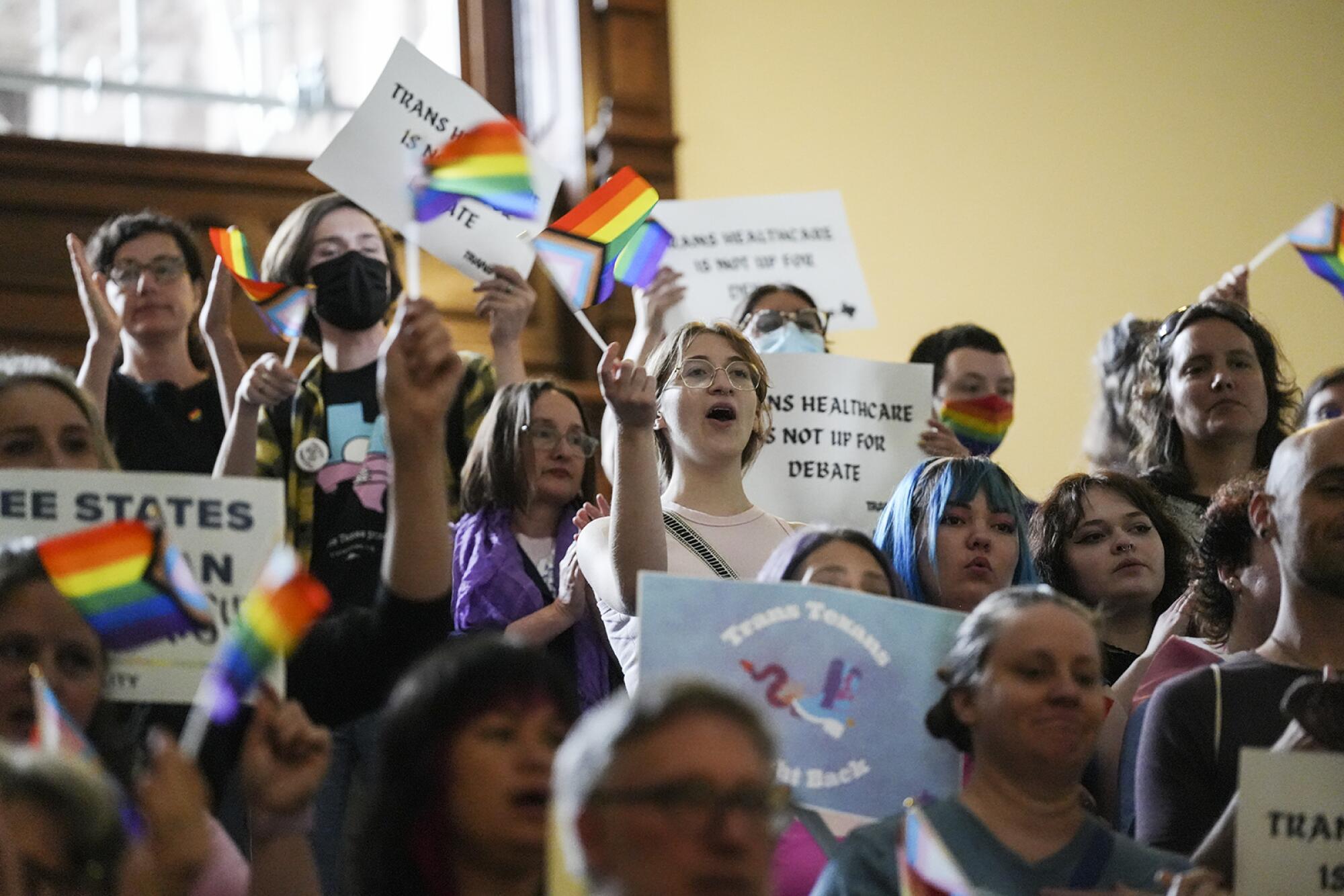
- Share via
WASHINGTON — Bans on treatment. New laws threatening doctors with malpractice suits and criminal charges. Praise from lawmakers who say their legislation is meant to protect minors, even as the new policies infringe on the rights of adults.
As state legislatures wind down and the 2024 election cycle kicks off, the similarities between the fights for abortion access and transgender rights have come into stark focus. Republican lawmakers have introduced a record number of bills at the state level and in Congress that would restrict the rights of transgender people and the healthcare they receive.
While the scope and magnitude of the legislation is unprecedented, the strategies being used are not.
“You can look at the antiabortion playbook and see parallels here every step of the way,” said Chase Strangio, the deputy director for transgender justice with the American Civil Liberties Union’s LGBT & HIV Project. “What we’re seeing is a lot of the effort from the right that had gone into systematically eliminating access to abortion ... being shifted into attacks on trans people.”
For decades, restricting access to abortion was a top priority for Republicans, a wedge issue that helped motivate the party’s base voters. That changed last year, when the Supreme Court’s Dobbs vs. Jackson Women’s Health Organization ruling overturned Roe vs. Wade, the landmark 1973 decision that established a nationwide right to abortion.
In the aftermath of that case, abortion has become a liability for Republican candidates caught between antiabortion groups pushing further bans and voters who have rejected such policies in recent elections.
Now, a new issue has dominated state legislatures: GOP state lawmakers have introduced more than 500 bills affecting the queer community and more than 70 of them have been signed into law, according to the Human Rights Campaign, an LGBTQ+ civil rights organization. The wave of bills prompted the group to declare a national state of emergency for LGBTQ+ people.
A key target of lawmakers has been gender-affirming care, which refers to a range of treatments — including social transition, counseling, hormone therapy, reversible puberty blockers for minors and surgery, generally for adults — that support a person’s gender identity when it doesn’t align with the sex they were assigned at birth. New state laws have banned medical interventions such as puberty blockers and hormones for minors; allowed students, teachers and colleagues to ignore people’s pronouns and blocked trans people from using the bathroom consistent with their gender identity.
Gender-affirming medical care has been available for decades, and studies show access to treatment lowers the odds of depression and suicide in patients. Major medical organizations, including the American Medical Assn., the American Academy of Pediatrics and the World Health Organization, have described the treatment as medically necessary and have opposed legislation that would restrict it.

The legal groups and conservative organizations working to restrict access to abortion — including the abortion pill mifepristone — are now defending laws restricting transgender rights as they are challenged in court. And Republican presidential candidates who have been reluctant to back national abortion restrictions have vowed to roll back transgender rights if elected.
For abortion and transgender rights advocates, the two issues are united by a common theme: an ability to make choices about one’s own body.
“Attacks on LGBTQIA+ people and attacks on abortion care are really inextricably linked,” said Heather Shumaker, the director of state abortion access at the National Women’s Law Center. “They’re both attacks on bodily autonomy and the right to take care of our own health, families and future.”
Strangio said the similarities between the two movements include protests and threats of violence against gender health centers and abortion clinics, as well as language “designed to appeal to people’s sense of disgust or fear or vulnerability,” such as “late-term abortion” or “genital mutilation.” Opponents of abortion and transgender rights have also used rare stories of regret over abortion or transition to argue those procedures should be banned.
Of the 20 states that have passed laws banning or restricting gender-affirming care for minors, 16 have banned abortion with few exceptions, had bans blocked by the courts or passed laws that allow abortions only in the first six weeks of pregnancy, before many people realize they’re pregnant. The rest have passed laws seeking to restrict access in ways that would have been unconstitutional under Roe.
Nebraska Gov. Jim Pillen, a Republican, signed a bill late last month to restrict access to gender transition treatment for people under age 19 and ban abortion after 12 weeks of pregnancy with few exceptions. The combined bill passed the Legislature after a weeks-long filibuster led by Democrats and a failed attempt to ban abortion at six weeks.
Texas became the largest state banning gender-affirming care for minors this month after Gov. Greg Abbott signed a bill to ban the treatment. Patients who are allowed to continue treatment under exceptions in the law must gradually “wean” off their medications.
For some health clinics, the efforts to limit gender-affirming care closely resemble the legal and legislative battles they recently endured over abortion. In recent years, Planned Parenthood offices and independent clinics have started offering gender-affirming care such as hormone therapy.

“There was a need, people were asking us about it,” said Katie Quiñonez, the executive director of the Women’s Health Center of West Virginia. The center started offering gender-affirming hormone therapy to adults in September, the same month West Virginia banned abortion with few exceptions.
Earlier this year, the state also banned gender-affirming care for minors unless they receive a diagnosis of “severe gender dysphoria” from two clinicians.
Quiñonez said the similarity between abortion and transgender care is that both are “unfairly stigmatized.” One hurdle the clinic has faced as it expands into offering hormone therapy has been getting out the word that it offers care in an inclusive environment. It also has plans to change its name.
Ash Orr, a West Virginia-based trans activist and former abortion patient, said they spent the 2022 legislative session advocating against the abortion ban and the 2023 session fighting anti-trans bills, including the state’s gender-affirming care ban for minors.
“When we knew that Roe was going to fall here and our access to abortion care was going to be stripped away, we knew they were going to be coming after trans folks next,” Orr said. “I fear that this is only the beginning of the attacks on trans healthcare.”
Most Americans are opposed to banning gender-affirming care for minors, but some polling has shown that public opinion has shifted among Republicans.
A pair of NPR/PBS NewsHour/Marist polls conducted in April 2021 and March 2023 found that a majority of Americans polled oppose laws to “criminaliz[e] providing gender transition-related medical care for minors” — 65% of adults surveyed said they opposed such laws in 2021, while 54% said the same in 2023. The share of adults who oppose the criminalization of gender-affirming care shifted the most among Republicans, dropping from 55% in 2021 to 35% in 2023. Opposition dropped 7 points among Democrats, to 68%, and 11 points among nonaligned voters, to 56%.

Mary Ruth Ziegler, a law professor at UC Davis and expert on the legal and political history of reproductive rights, said the “linchpin of the strategy” used by opponents of both abortion access and transgender rights has been “starting with the rights of minors.” After Roe was decided, abortion opponents shifted their attention to minors accessing abortions by promoting parental consent laws.
“If people are on the fence about whether they’re going to tolerate something — a decision that’s different from what they would make — they tend to be more uncomfortable when it’s their own child, or even the thought of any child making that decision,” Ziegler said. “It was always, then as now, designed to be an opening wedge in an effort to delegitimize whatever it was for everyone.”
Conservatives have tried to frame their efforts to limit transgender healthcare access as an effort to protect children and the rights of parents, even as the laws introduced around the country have increasingly focused on adults. States have passed bills limiting public funding for gender-affirming care and targeted Medicaid and private insurance coverage.
Oklahoma lawmakers introduced a bill in January that would have banned gender-affirming care for anyone under the age of 26, but backtracked after intense resistance.
In Missouri, Atty. Gen. Andrew Bailey announced an emergency order in April that would have severely restricted access to gender-affirming care for adults and minors. Bailey withdrew the order after a St. Louis County Circuit Court judge paused enforcement and the state Legislature passed a ban on gender-affirming care for minors.
Bailey’s emergency order followed an investigation his office launched in January into allegations made by a former caseworker at the Washington University Transgender Center at St. Louis Children’s Hospital. The former employee claimed the center didn’t give patients enough information about treatment risks and failed to offer proper screenings and counseling. An eight-week review by the university found the accusations were “unsubstantiated.”
“What is unique about the political attacks on the trans community is the rapid nature in which they are moving this slate forward,” said Dr. Colleen McNicholas, the chief medical officer of Planned Parenthood of the St. Louis Region and Southwest Missouri in St. Louis. “What took them 40 years to dismantle in abortion is really happening over one to two years in the trans community.”
Over the last few years, the St. Louis region’s Planned Parenthood has weathered laws that forced other clinics to stop offering abortions and an attempt to block the renewal of their abortion licenses. When Roe vs. Wade was overturned last year, officials announced the state’s trigger law would go into effect immediately, banning abortion in the state.
Once Missouri’s gender-affirming care ban goes into effect in August, Planned Parenthood will no longer be able to offer hormone therapy to new 16- and 17-year-old patients. The center has urged patients to establish care now.
Planned Parenthood is also borrowing from its own abortion playbook. Last year Planned Parenthood helped launch a program to help pregnant people from across the South fund their travels to the center’s Fairview Heights, Ill., clinic, just across the border from St. Louis. It is preparing to expand that program for transgender patients.
“I oftentimes tell our supporters: If you stood with Planned Parenthood because you thought people deserve access to abortion, then you must stand with us when we fight for access for our trans community to access the care that they need, because the fights are not different,” McNicholas said.
More to Read
Get the L.A. Times Politics newsletter
Deeply reported insights into legislation, politics and policy from Sacramento, Washington and beyond. In your inbox three times per week.
You may occasionally receive promotional content from the Los Angeles Times.











